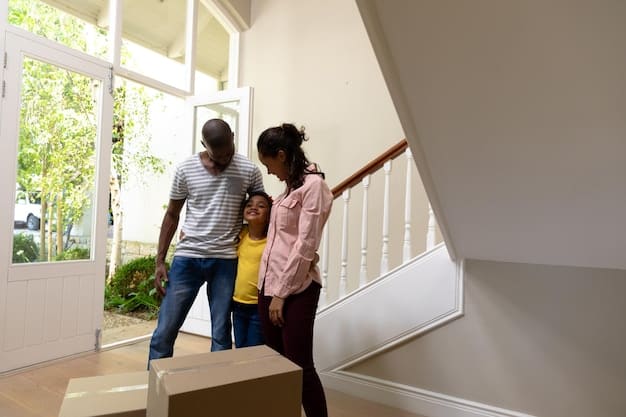Legal Rights of Displaced Persons in the US: A Complete Guide

Understanding the legal rights of displaced persons in the US is crucial for ensuring their protection and access to essential services. This guide comprehensively explores these rights, covering key aspects such as housing, healthcare, education, and legal assistance, providing a valuable resource for both displaced individuals and those who support them.
Navigating displacement can be overwhelming, especially when trying to understand your legal rights. This article provides a comprehensive guide to the legal rights of displaced persons in the US: A Comprehensive Guide, ensuring you have the information you need to protect yourself and your family.
Understanding Displacement and Legal Rights
Displacement within the United States can occur due to a variety of factors, including natural disasters, domestic violence, and economic hardship. Understanding the legal rights afforded to displaced persons is crucial for ensuring their safety, stability, and access to essential services.
This guide aims to provide clarity on these rights, offering a comprehensive overview of the protections available under federal and state laws. Knowing your rights is the first step toward navigating the challenges of displacement and rebuilding your life.
Defining Displacement
Displacement refers to the involuntary movement of people from their homes or usual places of residence. This can be temporary or permanent, and it often results in significant disruption to their lives and livelihoods. Understanding the causes and consequences of displacement is essential for developing effective strategies to support affected individuals.
Federal and State Protections
Both federal and state laws offer various protections for displaced persons in the US. These protections can include emergency assistance, housing support, access to healthcare, and legal aid. The specific protections available may vary depending on the reason for displacement and the location of the displaced individual.
- Emergency shelter and temporary housing assistance.
- Access to healthcare services, including mental health support.
- Enrollment in public schools for children.
- Legal assistance for navigating complex legal issues.
Understanding the landscape of displacement and the available legal protections is vital for both displaced individuals and those who seek to assist them. By knowing your rights, you can better advocate for your needs and access the resources necessary to rebuild your life.

In conclusion, displacement presents significant challenges, but understanding the applicable legal rights is a crucial step toward recovery and stability. This guide provides a foundation for navigating those rights, empowering displaced individuals to advocate for their needs and access available resources.
Housing Rights for Displaced Persons
One of the most critical needs for displaced persons is housing. Understanding your housing rights is essential for securing safe and stable accommodation. Both federal and state laws provide various protections to ensure that displaced individuals have access to housing assistance and are protected from discrimination.
This section outlines key housing rights, including emergency housing assistance, protection against discrimination, and the process for applying for housing benefits. Knowing these rights can help you navigate the complex process of securing housing and ensure that you are treated fairly.
Emergency Housing Assistance
Emergency housing assistance is often the first step in securing shelter for displaced persons. Many organizations and government agencies offer temporary housing solutions, such as shelters, transitional housing programs, and hotel vouchers. These programs provide immediate relief and support while individuals seek more permanent housing options.
Protection Against Discrimination
Displaced persons are protected from discrimination in housing based on factors such as race, color, religion, national origin, familial status, and disability. The Fair Housing Act prohibits landlords and housing providers from denying housing to individuals based on these protected characteristics. If you believe you have experienced housing discrimination, you have the right to file a complaint with the Department of Housing and Urban Development (HUD).
- Understanding the Fair Housing Act and its protections.
- Filing a complaint with HUD if you experience discrimination.
- Seeking legal assistance from fair housing organizations.
Applying for Housing Benefits
There are various housing benefits available for displaced persons, including Section 8 vouchers, public housing, and other rental assistance programs. The eligibility requirements and application processes for these programs can vary, so it is important to research the specific programs available in your area. Contacting local housing agencies and social service organizations can provide valuable assistance in navigating the application process.
By understanding your housing rights and the resources available to you, you can take proactive steps to secure safe and stable housing. Remember to document any instances of discrimination and seek legal assistance if necessary to protect your rights.

In short, housing is a fundamental need for displaced persons, and various legal protections and resources are available to help secure it. Knowing your rights, accessing emergency assistance, and applying for housing benefits are crucial steps in the process.
Access to Healthcare for Displaced Individuals
Access to healthcare is a fundamental right, and it is particularly crucial for displaced individuals who may be facing increased health risks and challenges. Understanding your healthcare rights can ensure that you receive the medical care you need during a time of displacement.
This section explores the healthcare rights of displaced individuals in the US, including eligibility for Medicaid and other public health programs, access to emergency medical care, and mental health services. Knowing these rights can help you navigate the healthcare system and access essential medical care.
Medicaid and Public Health Programs
Medicaid provides healthcare coverage to eligible low-income individuals and families, including many displaced persons. Eligibility requirements for Medicaid vary by state, but many states offer coverage to individuals and families who meet certain income and asset thresholds. In addition to Medicaid, other public health programs, such as the Children’s Health Insurance Program (CHIP), may provide coverage for children.
Emergency Medical Care
Under federal law, hospitals are required to provide emergency medical care to all individuals, regardless of their ability to pay or immigration status. This means that displaced persons have the right to receive emergency medical care at any hospital, regardless of their insurance coverage. Understanding this right can be life-saving in emergency situations.
- Hospitals must provide emergency care regardless of insurance or immigration status.
- You have the right to request language assistance services at hospitals.
- Document your medical history and any ongoing medical conditions.
Mental Health Services
Displacement can have a significant impact on mental health, and access to mental health services is essential for recovery. Many community mental health centers and social service agencies offer counseling, therapy, and other mental health services to displaced persons. Additionally, some states have programs specifically designed to support the mental health needs of disaster survivors.
Navigating the healthcare system can be challenging, but understanding your rights and the available resources can make a significant difference. Remember to document your medical history, seek assistance from social service agencies, and advocate for your right to receive the medical care you need.
In conclusion, healthcare is a critical need for displaced persons, and various legal protections and resources are available to ensure access to care. Understanding your rights, enrolling in Medicaid, and seeking emergency and mental health care are essential steps in protecting your health during displacement.
Educational Rights of Displaced Children
Ensuring that displaced children have access to education is crucial for their long-term well-being and future success. Federal law provides specific protections to ensure that displaced children have the right to enroll in school, receive appropriate educational services, and participate fully in school activities.
This section outlines the educational rights of displaced children in the US, including immediate enrollment in school, access to free and reduced-price meals, and support services for students with special needs. Knowing these rights can help parents and guardians advocate for their children’s educational needs and ensure they receive a quality education.
Immediate Enrollment in School
Under the McKinney-Vento Act, displaced children have the right to enroll in school immediately, even if they do not have the documents typically required for enrollment, such as proof of residency or immunization records. Schools are required to waive these requirements and enroll displaced children immediately to minimize disruption to their education.
Free and Reduced-Price Meals
Displaced children are automatically eligible for free and reduced-price meals at school. This ensures that they have access to nutritious meals, which are essential for their health and academic performance. Parents and guardians can apply for free and reduced-price meals through the school’s food service department.
- Contact the school’s homeless liaison for assistance with enrollment.
- Apply for free and reduced-price meals for your children.
- Seek support services for students with special needs.
Support Services for Students with Special Needs
Displaced children with disabilities have the right to receive special education and related services to meet their unique needs. Schools are required to conduct evaluations to identify students with disabilities and develop individualized education programs (IEPs) to address their specific learning needs. Parents and guardians have the right to participate in the IEP process and advocate for their children’s educational needs.
Advocating for your children’s educational rights is essential for ensuring that they receive a quality education and have the opportunity to succeed. Remember to contact the school’s homeless liaison, apply for free and reduced-price meals, and seek support services for students with special needs to ensure that your children receive the education they deserve.
In short, education is a critical need for displaced children, and various legal protections are in place to ensure access to it. Immediate enrollment, free meals, and support services are essential components of ensuring that displaced children receive a quality education.
Legal Assistance and Representation
Navigating the legal system can be challenging, especially for displaced persons who may be facing a variety of legal issues, such as housing disputes, immigration matters, and family law issues. Understanding your right to legal assistance and representation is essential for protecting your rights and resolving legal problems.
This section outlines the legal assistance and representation rights of displaced individuals in the US, including access to free legal aid, pro bono services, and the process for finding and working with an attorney. Knowing these rights can help you navigate the legal system and ensure that you receive fair treatment.
Free Legal Aid
Free legal aid is available to low-income individuals and families who cannot afford to hire an attorney. Legal aid organizations provide a range of legal services, including advice, representation, and advocacy on a variety of legal issues. To find a legal aid organization in your area, contact your local bar association or search online for legal aid providers.
Pro Bono Services
Many attorneys offer pro bono services, which means they provide legal assistance for free to individuals who cannot afford to pay. Pro bono services are often offered by attorneys who are committed to public service and helping those in need. Contact your local bar association or legal aid organization to find attorneys who offer pro bono services in your area.
- Contact your local bar association for referrals to legal aid organizations.
- Seek assistance from pro bono attorneys in your area.
- Consider the specific legal issue when choosing an attorney.
Finding and Working with an Attorney
Finding and working with an attorney can be a daunting task, but it is essential for protecting your rights and resolving legal problems. When choosing an attorney, consider their experience, expertise, and fees. It is also important to communicate clearly with your attorney and provide them with all the information they need to represent you effectively.
Remember, legal assistance is available to help you navigate the legal system and protect your rights. Take advantage of free legal aid, pro bono services, and other resources to ensure that you receive fair treatment and have the opportunity to resolve your legal issues.
In short, legal assistance is a critical need for displaced persons, and various resources are available to ensure access to it. Free legal aid, pro bono services, and effective communication with an attorney are essential components of navigating the legal system.
Additional Resources and Support
In addition to the legal rights and protections outlined in this guide, there are a variety of additional resources and support services available to displaced persons in the US. These resources can provide assistance with housing, food, clothing, job training, and other essential needs.
This section highlights some of the key resources and support services available to displaced individuals, including government agencies, non-profit organizations, and community-based programs. Knowing these resources can help you access the support you need to rebuild your life and achieve stability.
Government Agencies
Various government agencies offer assistance to displaced persons, including the Federal Emergency Management Agency (FEMA), the Department of Housing and Urban Development (HUD), and the Social Security Administration (SSA). These agencies provide a range of services, such as disaster assistance, housing vouchers, and social security benefits. Contact these agencies directly or visit their websites to learn more about the services they offer.
Non-Profit Organizations
Many non-profit organizations are dedicated to supporting displaced persons, including the American Red Cross, the Salvation Army, and local community organizations. These organizations provide a range of services, such as emergency shelter, food and clothing assistance, and job training. Contact these organizations directly or visit their websites to learn more about their programs and services.
- Contact FEMA for disaster assistance and resources.
- Seek assistance from non-profit organizations in your area.
- Participate in community-based programs and support groups.
Community-Based Programs
Community-based programs offer a range of support services to displaced persons, including counseling, job training, and English language classes. These programs are often run by local community centers, churches, and other organizations. Contact your local community center or church to learn more about the programs and services available in your area.
Reaching out for help is a sign of strength, and there are many resources available to support you during this challenging time. Remember to contact government agencies, non-profit organizations, and community-based programs to access the assistance you need to rebuild your life and achieve stability.
In conclusion, additional resources and support are available to help displaced persons navigate the challenges of displacement and rebuild their lives. Government agencies, non-profit organizations, and community-based programs offer a range of services to meet the diverse needs of displaced individuals.
| Key Point | Brief Description |
|---|---|
| 🏠 Housing Rights | Access to emergency shelter, protection from housing discrimination. |
| ⚕️ Healthcare | Eligibility for Medicaid, access to emergency treatment and mental health services. |
| 📚 Education | Immediate school enrollment, free meals, and special needs support. |
| ⚖️ Legal Aid | Access to free legal aid and pro bono services for legal issues. |
Frequently Asked Questions
▼
A displaced person is someone who has been forced to move from their home due to circumstances beyond their control, such as natural disasters, domestic violence, or economic hardship. This movement can be temporary or permanent.
▼
Contact local shelters, the Red Cross, or FEMA for immediate housing assistance. Many organizations offer temporary housing solutions like shelters or hotel vouchers to provide a safe place to stay.
▼
Displaced individuals may be eligible for Medicaid or other public health programs. Emergency medical care is available to everyone regardless of their ability to pay or their immigration status in USA.
▼
Yes, under the McKinney-Vento Act, displaced children can enroll in school immediately, even without typical enrollment documents. Contact the school’s homeless liaison for assistance with enrollment USA.
▼
Contact your local bar association or search online for legal aid organizations that offer free legal assistance to low-income individuals. Some attorneys also provide pro bono services for those in need.
Conclusion
Understanding the legal rights of displaced persons in the US is essential for ensuring their safety, stability, and access to essential services. This guide has provided a comprehensive overview of these rights, covering key aspects such as housing, healthcare, education, and legal assistance. By knowing your rights and the resources available to you, you can take proactive steps to rebuild your life and advocate for your needs during a time of displacement.





